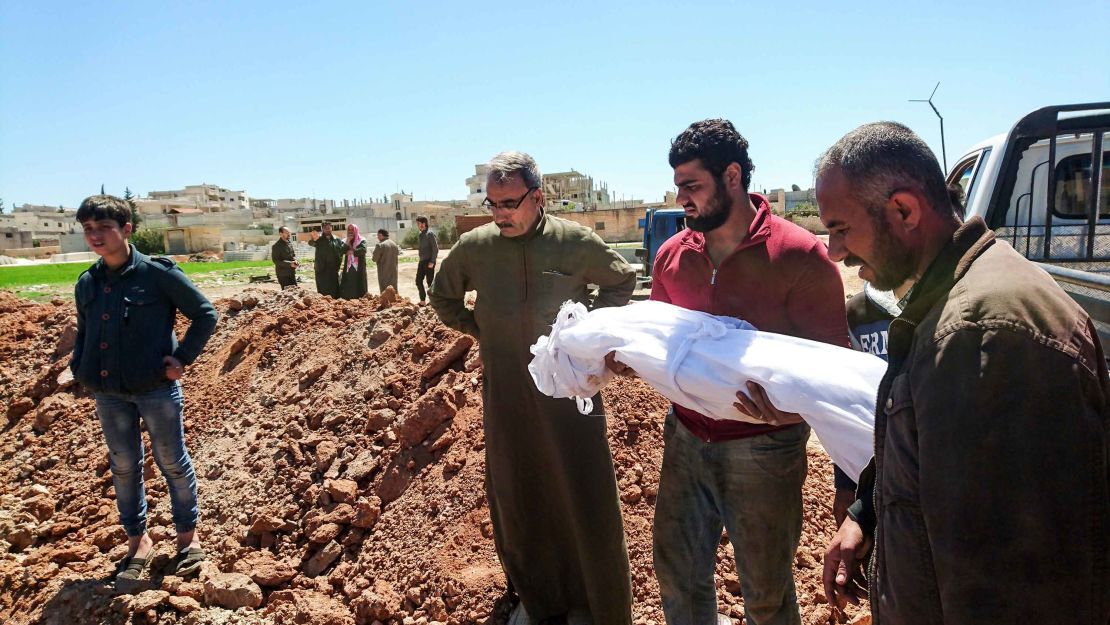Story highlights
Chemical weapons authority's results from samples of 10 victims
Findings show stockpiles of Sarin still exist in Syria
International chemical weapons inspectors have found “incontrovertible” evidence that Sarin gas, or a similar substance, was used in a chemical attack in Syria earlier this month that killed 89 people.
The Organization for the Prohibition of Chemical Weapons (OPCW) took biomedical samples from 10 victims of the April 4 attack on Khan Sheikhoun and found indications that they had been exposed to Sarin or a Sarin-like substance.
The findings show that stockpiles of Sarin still exist in Syria. The OPCW was in 2013 responsible for overseeing the destruction of Syria’s chemical weapon stockpile, following an attack in the Ghouta area of Damascus that activists say killed 1,400 people.

The OPCW’s director-general, Ahmet Uzumcu, said the biomedical samples were collected from three victims during their autopsies, as well as seven others undergoing treatment in hospital.
“While further details of the laboratory analyses will follow, the analytical results already obtained are incontrovertible,” Uzumcu said in a statement.
UK scientists had already found that Sarin or a similar chemical had been used in the attack, having tested samples smuggled from the site.
Asked by CNN whether its evidence amounted to proof that the Syrian regime carried out the attack, the OPCW said that it was still investigating the incident. It pointed out that its mandate was to investigate the facts surrounding the attack.
In a statement issued Thursday, the Russian Defense Ministry said Uzumcu’s comments raise questions about the OPCW’s impartiality.
Russia reported a case of sulfur mustard use by insurgents in Aleppo in 2016 but the OPCW “has not managed to make a definite conclusion,” the statement said.
However, Uzumcu quickly came to a conclusion about what happened in the Khan Sheikhoun attack, the statement said.
“Mr. Uzumcu let the OPCW down,” the statement said. “How can they explain that there are lots of charlatans of the White Helmets ‘working’ in sarin vapors in Khan Sheikhoun if the sarin had been used there really?”
The attack in Khan Sheikhoun has been widely blamed on the Syrian government, though Damascus denies it had anything to do with the attack and also denies it has any chemical weapons.
Syria has blamed terrorist groups for the attack, and Russian President Vladimir Putin suggested that the attack was carried out by “forces” trying to frame the regime of Syrian President Bashar al-Assad.
Russia is Syria’s most powerful ally and has bankrolled much of the six-year conflict, carrying out regular airstrikes in Syria to prop up Assad’s regime.
The attack in Syria prompted the United States to launch its first military strike on the Syrian regime in the six-year war, causing a major rift between Washington and Moscow.
On President Donald Trump’s orders, US warships launched 59 Tomahawk cruise missiles at the airbase that was home to the warplanes that carried out the chemical attacks, US officials said.
The chemical attack has boosted international calls to oust Assad from power as international ceasefire and peace talks continue to end the conflict, which has killed 400,000 people, according to UN data.
CNN’s Lauren Said-Moorhouse contributed to this report.


